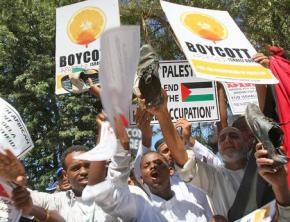Action is what’s called for
Irish socialist makes the case for renewing efforts to organize a boycott of Israel in the wake of the attack on the Gaza Freedom Flotilla.
TWENTY-FIVE years ago, I used to spend a couple afternoons a week outside Dunnes Stores in Henry Street in Dublin. Eleven young workers had been sacked for refusing to handle South African goods. We were picketing for their reinstatement.
Their union had passed a |motion at its annual conference supporting the boycott. Head office circulated union reps with the terms of the resolution. The Henry Street rep was Mary Manning (age 21). She read the leaflet and--a startling thing--took it dead seriously.
When a customer presented a basket containing two Outspan grapefruit, Mary apologized that she couldn't check the goods out because her union was boycotting South Africa on account of the way Black people there were being treated. She was immediately suspended. Ten others walked out with her.
The Dunnes Stores strikers are remembered in the South now as folk-heroines of the anti-apartheid struggle. Leaders of major parties still sometimes name-check them as exemplifying an idealism that Ireland can be proud of.

But none offered support at the time. No Dublin newspaper editorialized in their favor. It took the Irish Congress of Trades Unions 15 months to call on the public to support them.
More than a year into the strike, in September 1985, Mary and Karen Gearon traveled to South Africa at the invitation of Archbishop Desmond Tutu. They were arrested on arrival at Jan Smuts Airport in Johannesburg, held at machine-gun-point for eight hours, and then deported back to Heathrow.
The Botha government claimed that their mission had been "to make propaganda for terrorism." Laughable now, when the boycott of the apartheid state has been retrospectively redefined as political common sense.
BACK THEN, some of the most heartening messages reaching campaigners came from within white South Africa itself--in which context we might consider a column published in the daily newspaper Ha'aretz last month as the relief flotilla prepared to set sail for Gaza.
Under the headline, "Boycotting the Boycotters," Gideon Levy wrote:
The most brutal, naked boycott is, of course, the siege on Gaza...At Israel's behest, nearly all Western countries signed onto the boycott with inexplicable alacrity. This is not just a siege that has left Gaza in a state of shortage for three years...it's a series of cultural, academic, humanitarian and economic boycotts.
In addition, Israel bars entry to anyone who wishes to lend humanitarian aid. We should note that the boycott isn't just against Hamas, but against all Gaza. The convoy of ships that will soon sail from Europe to try to break the siege will carry thousands of tons of construction material, prefab houses and medicine. Israel has announced that it plans to stop the vessels...a boycott is a boycott. Yet the thought of boycotting the boycotter? Now that's inconceivable!
Levy, the son of Holocaust survivors and a former officer in the Israeli army, is editor of Ha'aretz.
Last month, the paper gave a lot of ink to Elvis Costello's withdrawal from concerts in Israel, quoting the singer:
There are occasions when merely having your name added to a concert schedule may be interpreted as a political act that resonates more than anything that might be sung, and it may be assumed that one has no mind for the suffering of the innocent...If these subjects are actually too grave and complex to be addressed in a concert, then it is also quite impossible to simply look the other way.
Five days before the commando attack on the relief convoy, Amnesty International's annual report said: "Israeli forces committed war crimes and other serious breaches of international law in the Gaza Strip during a 22-day military offensive that ended on January 18 [2009]...They carried out indiscriminate and disproportionate attacks against civilians, targeted and killed medical staff, and used Palestinian civilians as 'human shields.'"
Israel's pro-forma response came from Gerald Steinberg, head of NGO Monitor, a specialist unit for rubbishing human rights concerns: "The accusations reflect the ideological bias that determines the content of Amnesty publications on Israel. Amnesty exploits human rights principles to demonize Israel."
Faced with meticulously detailed evidence of atrocity, Israel waves it away with a flap of the hand and acrid hints of anti-Semitism. Likewise for the findings of Human Rights Watch, the UN, the report on the Gaza assault by Judge Richard Goldstone, the evidence of journalists.
The case for boycotting Israel is as strong and well-made now as was the case for boycotting apartheid a generation ago.
Sooner or later, the boycott of Israel will become political common sense. Governments won't move until there is movement from below. Action is what's called for. What else is there left to do?
First published in the Belfast Telegraph.


